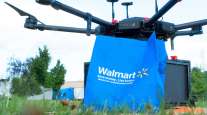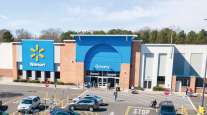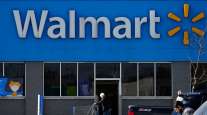Perspective: Blockchain Useful in the Food Supply Chain
[Stay on top of transportation news: Get TTNews in your inbox.]
For carriers and shippers that specialize in food delivery, a lack of visibility and traceability can be dangerous. If there is a risk of foodborne illnesses with a particular shipment that is not being carefully tracked, the potential scope could be uncertain for some time — especially if health officials are unable to issue a recall due to an inability to track where the potential outbreak originated.
Food safety is especially top-of-mind in the United States, as families around the country prepare sit down soon and enjoy a Thanksgiving feast. Companies want to make sure that the turkey, cranberries, mashed potatoes and other delicacies their customers purchase are safe.
The level of risk and uncertainty that comes with food safety issues illustrates why the global food supply chain needs better methods for preventing contamination. Businesses need to improve transparency and real-time visibility — the ability to track shipment data in real time from origin through the final destination.

Monarch
Blockchain technology is capable of providing this kind of end-to-end transparency about where food originated and traveled, which can help reduce the risk of foodborne illness and the cost of produce contamination. In a non-blockchain environment, it can take weeks or longer to pinpoint the exact farm or processing plant responsible for contamination, and people can fall ill in that time.
Blockchain makes the storage and access of verified data possible by logging that data in an immutable ledger. Participants are connected on the blockchain, and each of them maintains a complete copy of the ledger, which updates with new transactions as they occur. This decentralized data storage validates the data against other nodes. Nodes are machines used by the participants. Since it relies on accurate data during entry, fleets and shippers should use automated data collection and logging functions.
Blockchain is immutable; it is not read, written, deleted or changed the way that databases are. It provides a complete record of a shipment’s history, eliminating any risk for retroactive changes or fraud. Businesses can quickly pinpoint the origins of contamination and stop it at its source. Moreover, they can prevent the waste of healthful produce that could get caught up in a recall if the origin of the contamination is unclear as well as damaged brand reputation from a foodborne illness.
Walmart is the most prominent retailer to require the use of blockchain in managing farm-to-table visibility, mandating the use of blockchain among produce suppliers after the 2018 romaine lettuce recall. Walmart implemented the policy and required suppliers to use blockchain.
Smucker’s and Douwe Egberts also invested in blockchain to track coffee beans from farm to table, but their platforms remain under ongoing development. The endgame is simple: Guarantee food safety through knowing exactly where beans were harvested and how they arrived at the facility/reseller.
Blockchain’s ledger-based capability, which allows two or more participants in the network to exchange information and assets directly without the need for a trusted intermediary, also can help with food safety. For example, payment processing capabilities that ensure verification of conditions can record raw meat temperatures through the entire transport journey, and only authorize payment after confirmation of safe delivery of the food that meets those conditions and temperatures. A determination that conditions were not maintained during a shipment could trigger a recall.
Of course, implementation of blockchain won’t take away all risks of foodborne illnesses, but it is a step in the right direction. As with any other technology, blockchain is only as good as the data initially entered into the system. In other words, it still relies on a human element and/or sensors. But humans need to be ready, because change is coming. Blockchain is more than hype.
Businesses should be able to use data better in new ways and reap greater rewards/insights. And businesses that deal with food safety — an issue that can affect every American — can help make sure they’re aware of where their food came from, the journey it took and the potential risks of contamination. It’s up to logistics technology firms to help educate supply chain leaders on how to benefit from blockchain solutions, and it’s up to the industry stakeholders to embrace the change.
John Monarch is the chief executive and co-founder of ShipChain, a blockchain startup focused on the freight, logistics and shipping industry.
Want more news? Listen to today's daily briefing:




